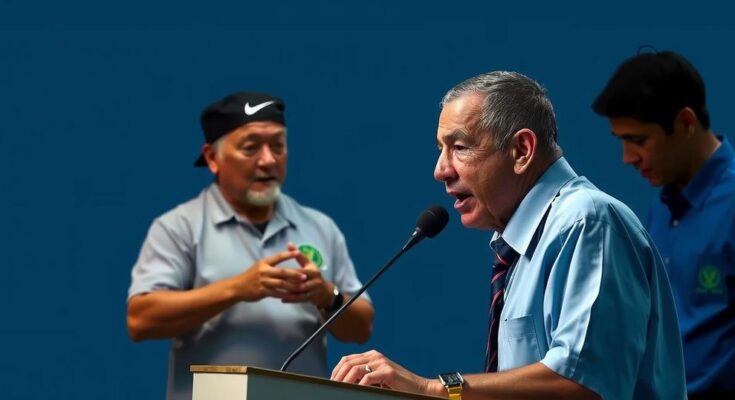In Uruguay’s presidential runoff on November 24, Yamandu Orsi faces Alvaro Delgado in a closely contested election. With Orsi having garnered 43.9% in the first round and Delgado 26.8%, the race is expected to be decided by a remarkably narrow margin. Both candidates are attempting to attract undecided voters as the political environment remains less polarizing compared to neighboring countries.
In the second round of the presidential elections in Uruguay, voters are set to cast their ballots in a tight race on November 24. The contest is between center-left candidate Yamandu Orsi, who achieved 43.9% in the earlier round, and conservative candidate Alvaro Delgado, who secured 26.8% but benefits from an alliance with the Colorado Party. Final opinion polls suggest a narrow margin of fewer than 25,000 votes could separate the candidates, creating an aura of suspense around the outcome.
Uruguay’s political landscape remains relatively stable, contrasting sharply with the more polarized environments in neighboring nations such as Argentina and Brazil. Orsi aims to reassure voters of continuity, asserting his intention to maintain the moderate policies characteristic of Uruguay’s governance. Meanwhile, Delgado promotes the notion of re-electing a successful government, leveraging the popularity of the outgoing President Lacalle Pou, who is ineligible for immediate renomination.
The electoral process continues to evolve as neither candidate has established a clear path to garner the support of approximately 8% of first-round voters who favored smaller parties, alongside those who abstained in the initial poll. Although the televised debate preceding the runoff did not significantly sway public opinion, both candidates remain determined to secure voter confidence in a year marked by historic electoral engagement globally. The results, expected shortly after polls close at 7:30 p.m., could signal a departure from the trend seen in other nations where incumbent parties have struggled to maintain support amid economic pressures.
Uruguay’s election comes at a time when political dynamics in South America are undergoing significant shifts, especially given the recent electoral trends in neighboring countries characterized by polarization and volatility. In contrast, Uruguay’s politics have maintained a moderate tone that appeals to a wide spectrum of voters. With a population of approximately 3.4 million, the elections embody a critical juncture for the nation, impacting its economic policies and political stability in the face of global economic challenges.
The outcome of Uruguay’s presidential runoff between Yamandu Orsi and Alvaro Delgado is poised to be closely contested, reflecting a broader trend in global politics where incumbent parties face increasing scrutiny. As voters navigate their options amidst economic pressures, the significance of this election likely extends beyond national borders, potentially influencing political landscapes in the larger region of South America.
Original Source: www.ndtv.com




